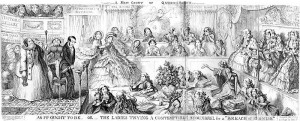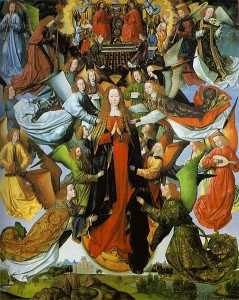You might think American society has come far in its belief of the equality of men and women or that women are free to do whatever they want in this day and age.
Nope.
Something called the cult of true womanhood or the cult of domesticity is very much alive today.
I love studying this kind of gender and communication studies stuff.
According to Barbara Welter’s research called The Cult of True Womanhood: 1820-1860, the cult of true womanhood consisted of four main virtues:
- piety
- purity
- submissiveness
- domesticity
These virtues held that a woman’s natural place was in the home where she was to care for her husband and children. In addition, women were viewed as being too emotional by nature to participate in such arenas as business and politics.
While these views clearly discriminated against women, they also put women on a pedestal by implying they were too good and pure to deal with nasty governmental politics.
That’s one reason women were denied the right to vote for so long: they’re too pure.
In their homes, presumable safely guarded from evil influences, supposedly angelic women directed households with serene moral influence. Because of their temperament and ability, women were allegedly unsuited to hard labor, to the rough-and-tumble political arena, and therefore to the competitive individualism of the industrial economy.
Welter adds that these concepts were so universally accepted back in the day that,
if anyone, male or female, dared to tamper with the complex of virtues that made up True Womanhood, he was damned immediately as the enemy of God, of civilization, and of the Republic.
Really, has this changed?
The workplace is socially constructed into a masculine space. Home is a feminine space.
Current commercialism plays heavily to this cult of womanhood. Books such as Men are from Mars, Women are from Venus tap into this idea women are dominated by emotion and this makes them ever-so-different than men.
Males are deemed more aggressive and charged with defending the home from the cruelties of the outside world. Women are deemed the gentler sex, charged with nurturing the young in a home that remains a refuge from the competitive world of work.

Drawing showing what might happen if women were allowed to be lawyers, judges and other court officers
Twenty-first century businesses are also eager to represent the home as distinct from the supposedly increasingly exploitive “workplace.” Restoration Hardware and Pottery Barn are just two stores catering to the color coordinated world away from work.
One of the more interesting passages from Welter is very applicable today.
Ernest concedes that, by George, there was a woman: ‘When I last had a cold she not only made me a bottle of cough syrup, but when I complained of nothing new to read, set to work and wrote some twenty stanzas on consumption.’
Does that not sound like nearly every capable woman in America today?
Source:
Barbara Welter, “The Cult of True Womanhood: 1820-1820,” in American Quarterly 18 (1966).


It’s interesting to me that such a paper was written about a time when there were thousands of women and children working in the textile industries. I believe that Welters was referring to the newly developing middle class of the day.
I must be doing something wrong as I’ve not had a single stanza presented to me to read as I lay in bed ill. Thankfully, I’ve also never had a bottle of homemade cough syrup.